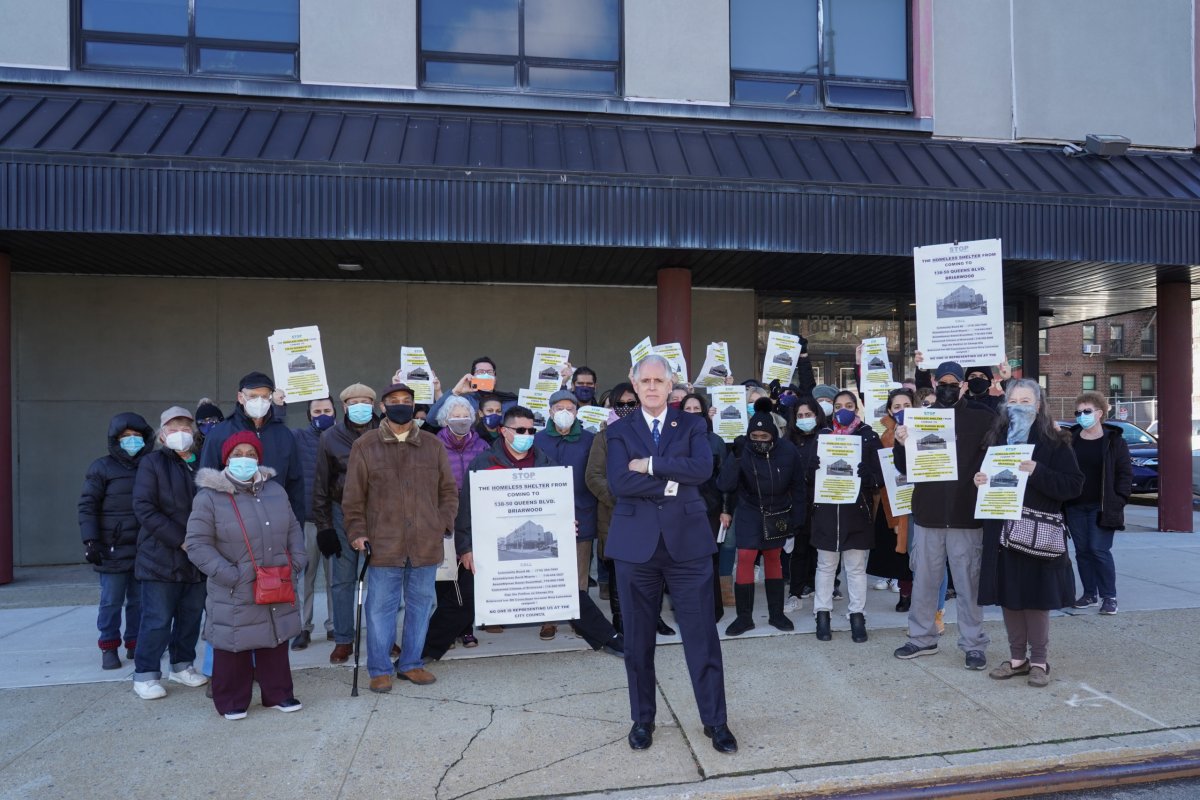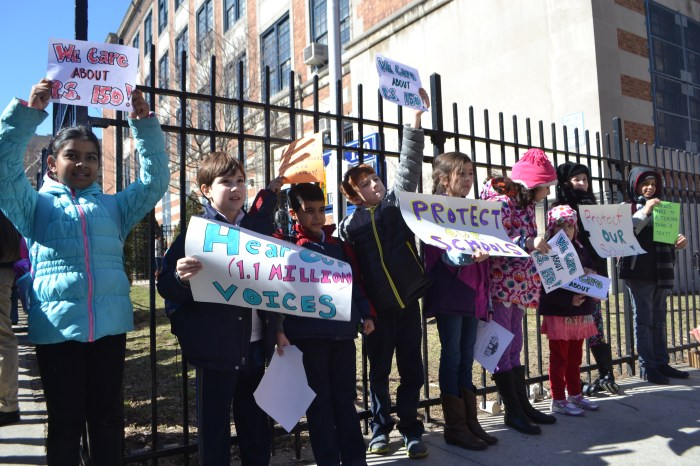As the city Department of Homeless Services (DHS) is planning to open a “high-quality, borough-based” men’s homeless shelter in Briarwood in 2022, residents and business owners in the neighborhood are rallying to shut it down.
James Gennaro, a former member of the New York City Council who is running to represent Council District 24, led a protest with residents on Jan. 4 outside of the proposed site of the shelter at 138-50 Queens Blvd.
Gennaro said the “175-barracks-type” men’s homeless shelter poses a real safety risk to Archbishop Molloy High School, a popular neighborhood playground, and the Briarwood Public Library.
“Fighting this shelter with the full authority of my office when I am elected will be my top priority,” Gennaro said. “The homeless, of course, need and deserve to be housed, treated and reassimilated back into society, but this site is the worst location imaginable for such a facility.”
The shelter, Gennaro said, will effectively “kill the potential of new development and vaporize untold millions in commercial and residential property values.”
With no shelters in the community district dedicated to serving single homeless adults, DHS said the Briarwood location will offer those individuals the opportunity to be sheltered in their home borough, closer to their support networks, including schools, jobs, healthcare, family, social services and communities they call home.
Westhab, a housing and social services provider, will supply those resources to the shelter, where 30 to 40 percent of the residents would be mentally ill and/or drug users. They will have the option of utilizing those services.
It’s an initiative under Mayor Bill de Blasio’s “Turning the Tide on Homelessness” plan to end the use of stop-gap measures like cluster sites and commercial hotel facilities citywide.
“New Yorkers from every community across the five boroughs have experienced and continue to experience homelessness, so we need every community to come together to address homelessness in – now more than ever, in the midst of this unprecedented crisis,” a DHS spokesperson said in a statement to QNS.
Since announcing the initiative, the agency has identified 88 high-quality shelter locations, with 43 shelters already helping New Yorkers experiencing homelessness. At those shelters, DHS has provided no less than 30 days’ notice and a combined average of more than 200 days’ notice regarding the opening of these locations.
DHS says they remain “committed to ensuring Queens communities have the critical safety net resources they need to support those who may fall on hard times, so they can get back on their feet closer to their support networks.”
Upon news of the shelter opening in Briarwood, Community Board 8 is against the proposal, according to District Manager Marie Adam-Ovide, who had a telephone discussion with Amanda Nasner, Queensborough director of DHS, Westhab and elected representatives in November.
Adam-Ovide learned there will be renovation and construction in the building, as it will be set up in a dormitory style with one bathroom per floor.
Like Gennaro, Ovide said there is already a family shelter in Briarwood and the single men’s homeless shelter would hinder development of other types of housing such as co-ops or rental apartments.
Residents are also worried about an increase in crime since the shelter will service individuals with drug abuse and mental illness, Adam-Ovide said.
“They are concerned that the residents do not have to participate in the programs and will just hang around in the neighborhood with nothing to do, for example, at the park or along Queens Boulevard,” Adam-Ovide said. “Additionally, it is in close proximity to the Umbrella Hotel that had triple murders on New Year’s Day.”
In response to the matter, an online petition was launched to stop the homeless shelter, citing the location’s proximity within a block of a liquor store and adjacent to a marijuana dispensary.
In terms of safety, DHS said Westhab will provide on-site, around-the-clock security and a 24-hour open line for the community to provide feedback in a timely manner and to immediately address any concerns that may arise.
As an added measure, a total of 75 security cameras will be installed throughout the building and across the shelter grounds, to allow security officers to continually monitor compliance with house regulations and good neighbor policies both in and around the facility.
Additionally, there will be a 10 p.m. curfew and clients who may be employed with late work hours will receive passes to return to the facility after curfew based on their documented work schedule.
Meanwhile, Adam-Ovide said she had followed up with Nasner by telephone requesting an official notification from DHS, as have other community boards when a homeless shelter is proposed.
“Was it an acquisition that requires a ULURP? No information was given on that at that time,” Adam-Ovide said. “We received an email with information that appeared to have been cut and pasted from some other document. We received a notice on the letterhead with a location in Far Rockaway addressed to me but with CB 14’s address.”
Adam-Ovide said they had received a letter on Jan. 6 with what appears to be correct information, but not on a letterhead.
“I spoke to Amanda Nasner of DHS again who stated that she would send it to us. We still have not received it as of this email,” Adam-Ovide said.
According to DHS, they have sent multiple annual letters to communities citywide, including offers for suggestions for potential sites to be utilized by the city and not-for-profit social service providers as shelter.
“To date, we have not received any responses or suggestions from the community for consideration,” a DHS spokesperson told QNS.
The spokesperson said DHS will continue to engage the community and maintain an open dialogue with all community stakeholders, including elected officials, community board members, local block associations, as well as faith-based and community-based organizations to ensure that the facility is “integrated seamlessly into the community and its clients receive a warm welcome.”
Furthermore, DHS will establish a Community Advisory Board (CAB) which will hold regular meetings and maintain direct lines of communication between staff, including on-site security, and communicate concerns.
In the meantime, Assemblyman Daniel Rosenthal’s office is working with the community to get more details on the shelter and a better understanding of what is going to happen, according to a spokesman, who added that Rosenthal wants to make sure that the city is keeping an open dialogue with the entire process.
































